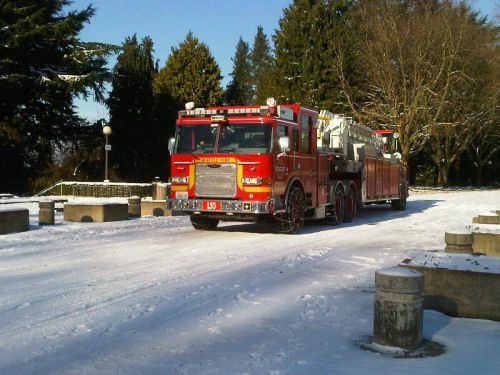
What a week of wintry weather we’ve seen, and it’s just one month into Winter 2020. It’s always a good idea to prepare before the next storm system arrives. With that in mind, here’s a list of practical tips for staying safe regardless of what comes next.

Keeping toasty at home
Give heaters plenty of space and power them properly. Keep flammable items one-foot from baseboard heaters and three-feet from portable space heaters and wood and gas fireplaces.
Plug portable heaters directly into an outlet. Never use an extension cord.
Turn portable heaters off before leaving the room or going to bed.
If the power goes out, layer clothes and blankets.
Use flameless candles and battery-operated flashlights. If you must use an open-flame candle, place in sturdy holders (metal, glass or ceramic) and extinguish before leaving the room or going to sleep.
Wood stove and fireplace maintenance
Cover wood and gas fireplaces with a safety screen to prevent sparks from landing on combustible materials in the room. It can also keep children from getting burned.
Make sure chimneys and flues are clear and clean.
Clean or replace the filter on your furnace.
Reduce the risk of carbon monoxide poisoning
Carbon monoxide poisoning can be deadly. If you experience symptoms of poisoning such as dizziness, vomiting or headaches, and move to fresh air immediately then call 911.
Do not use items that produce carbon monoxide like BBQ grills or generators inside your home, your garage or outside of a window.
Never use gas ovens to heat your home, even for a short time.
Make sure that woodstove and fireplace chimneys and flues are clear and in good condition.
Never idle a car in a garage, even when the garage door is open.
Install and regularly test your CO alarms. The best locations for these devices are on every level of your home and outside sleeping areas.
If the CO alarm sounds, turn off any heating appliance and open windows to get fresh air.
Carbon monoxide poisoning can be deadly. If you experience symptoms of poisoning such as dizziness, vomiting or headaches, and move to fresh air immediately then call 911.
Road safety
Not able to stay home? Consider these tips for increasing your safety on the road.
Drive for the conditions. Assume roads are icy and take extra precaution. Leave space between you and the vehicle ahead.
Keep your fuel tank more than half-full.
Pack an emergency kit in case you become stuck in your car. Items to include: flashlight, first aid kit, necessary medications, water, food, emergency contact information, blanket or sleeping bag, extra warm clothes, jumper cables and mobile phone charger.
Keep an ice scraper/brush and small snow shovel in your vehicle. Roof tiles, sand or kitty litter can give your tires traction in icy conditions.
Tire cables, chains and four-wheel drive are recommended for traveling in the snow. Icy conditions are treacherous for any vehicle.
Downed power lines
Calls to 911 about downed power lines increase during snow and wind storms. Always assume they are energized and can result in possible electrocution. Here’s what you should do if you encounter one.
If your vehicle collides with a light pole:
Call 911 to report your location.
Warn others to stay away from your vehicle.
If wires have fallen on your car, stay in your vehicle until firefighters arrive.
If you MUST exit the vehicle because of fire or other danger: (1) JUMP away from the vehicle; (2) LAND with both feet together; (3) SHUFFLE away. Take short steps and keep your feet in contact with each other and the ground constantly until you’re at least 35-feet away.
If you see a downed wire:
Call 911 to report the location.
If you have caution tape on hand, block off the area so others see the danger. Do not get any closer than 35-feet to the downed wire or touch it with any object.